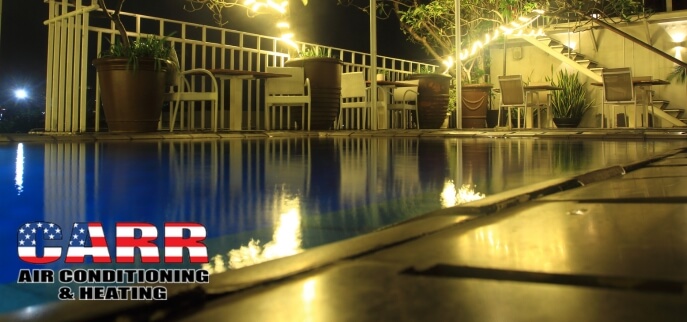How do pool heat pumps work? If your pool has a heat pump, what repair and maintenance tasks should you leave to the professionals? Pool heat pumps are energy-efficient devices designed to raise the water temperature in your swimming pool, ensuring a comfortable and enjoyable swimming experience.
Today, we’ll explain the working principles of pool heat pumps and outline common maintenance and repair tasks best handled by experts.
Understanding How Pool Heat Pumps Work
Pool heat pumps are a popular choice for heating swimming pools due to their energy efficiency and eco-friendliness. Unlike gas pool heaters that use burning gas to generate heat, heat pumps harness the heat from the air to warm the water in your pool.
Here’s a step-by-step breakdown of how pool heat pumps work:
Evaporator Coil
The process begins when warm air from the surrounding environment is drawn into the heat pump. This warm air passes over the evaporator coil, which contains a liquid refrigerant.
Heat Absorption
The liquid refrigerant absorbs the heat from the warm air, causing it to evaporate and turn into a gas.
Compression and Heat Creation
The gas, now in a high-pressure state, is compressed by the compressor within the heat pump. This compression process significantly increases the gas’s temperature, creating hot gas.
Heat Transfer
The hot gas flows through the condenser coil, transferring its heat to the water from the pool that circulates through the coil.
Heat Transfer to Water
As the hot gas releases its heat into the water, it condenses back into a liquid refrigerant.
Returning to the Evaporator
The liquid refrigerant returns to the evaporator coil to repeat the cycle and continue heating the pool water.
This continuous cycle heats your pool efficiently by utilizing the warm air, and it’s more energy-efficient compared to traditional gas pool heaters.
Common Repair and Maintenance Tasks
While pool heat pumps are reliable and efficient, they require regular maintenance to ensure they operate optimally and have a long lifespan.
Here are some common maintenance tasks and repair issues that homeowners should rely on professionals to handle:
Refrigerant Levels
Checking and adjusting refrigerant levels is a crucial maintenance task. Too much or too little refrigerant can affect the efficiency and effectiveness of the heat pump.
Electrical Components
Testing and maintaining electrical components, including connections, wires, and controls, to ensure they function correctly and safely.
Condenser and Evaporator Coils
Cleaning and inspecting the condenser and evaporator coils to ensure they are free of debris and functioning efficiently.
Fan and Airflow
Inspecting and cleaning the fan and airflow system to maintain proper air circulation, which is essential for effective heat transfer.
Defrost Cycle
Checking and testing the defrost cycle to ensure it functions correctly during colder weather, preventing ice buildup on the outdoor unit.
Heat Exchanger
Inspecting and cleaning the heat exchanger to ensure optimal heat transfer and prevent any corrosion or scaling.
Professional Repairs
Any complex or major repairs, such as compressor issues or motor malfunctions, should be handled by experienced HVAC professionals to ensure safety and proper functioning.
Contact Carr AC for Pool Heat Pump Repair and Maintenance
Understanding how pool heat pumps work is essential for homeowners looking to efficiently heat their swimming pools while minimizing energy consumption. Regular maintenance and timely repairs by professionals ensure that your pool heat pump operates effectively, providing you with a comfortably heated pool throughout the year. For expert assistance and maintenance of your pool heat pump, rely on Carr AC!
Our expert HVAC technicians will inspect, repair, and maintain your swimming pool heat pumps to ensure they are working all year long! Contact our team today for a consultation.

